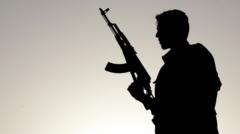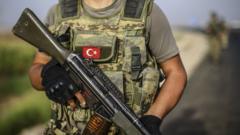Despite the announcement, uncertainty looms over the future of thousands of fighters and whether a true reconciliation process can unfold.
'Families Hope for Peace as PKK Disbandment Signals Change'

'Families Hope for Peace as PKK Disbandment Signals Change'
Families of PKK fighters are holding onto hope for a lasting peace following the group's decision to disband, after a 40-year conflict with Turkey.
In a moment many deemed historic, the Kurdistan Workers' Party (PKK) recently disclosed its intent to disband, prompting a wave of hope among families who yearn for peace after decades of conflict with Turkey. For Leila, a mother whose son left three years ago to join the PKK, the announcement sparked dreams of reunion. Since her son ventured into the remote Qandil Mountains—recognized as a safe haven for the group—Leila has seen him only through a couple of videos, the last over six months ago.
The PKK, branded as a terrorist organization by Turkey, the US, UK, and EU, has been embroiled in a bloody struggle for Kurdish rights, claiming over 40,000 lives throughout its long history. As families express their sentiments, there exists a stark divide: some proudly celebrate their loved ones’ sacrifices, viewing them through a lens of valiant struggle for and defense of Kurdish rights, while others express deep resentment toward the group, echoing feelings of betrayal.
Despite the significant announcement, the anticipated peace process remains tentative. Although Turkey’s President Recep Tayyip Erdogan celebrated the PKK’s decision as a major step toward a “Turkey without terrorism,” the lack of formal agreements, and continued reports of violence, indicate lingering tensions. Some PKK leaders assert that a peaceful resolution hinges on the release of their imprisoned leader, Abdullah Ocalan.
The Qandil Mountains, the PKK’s stronghold, continue to bear the scars of this conflict. Access to these regions remains heavily restricted, with the PKK denying media entry as they navigate potential discussions involving disarmament and the future of their operatives. Amid such uncertainty, families like Leila’s cling to the hope of reunion, longing for their loved ones to return from the mountains and the harsh realities of guerrilla life.
Among other families, the bittersweet emotions continue to unfold as they confront loss and the tribulations associated with the conflict. Rondek Takoor, mourning her brother who died two years ago fighting for the PKK, reflects on the struggles faced by families in zones of conflict. For her, the idea of the PKK disbanding brings both pride in her brother's sacrifice and a profound sense of loss.
The aftermath of disbandment remains uncharted territory. Questions arise about the fate of the Turkish PKK fighters and their potential reintegration into society. Despite assurances that those without crimes could return, the political landscape remains fraught with complications. The implications extend beyond Turkey, resonating with Kurdish groups across Iraq, Syria, and Iran, while various factions grapple with the ramifications of these tumultuous changes.
Leila’s focus, however, narrows to a personal desire: to have her son return to her side. In her heart, she hopes that the mountain life will become too burdensome for him, recognizing the toll of such a path. As she contemplates a future where her son is with her, she looks toward a city that has become a source of pain, vowing to move away if her wish for reunion comes to pass.
The PKK, branded as a terrorist organization by Turkey, the US, UK, and EU, has been embroiled in a bloody struggle for Kurdish rights, claiming over 40,000 lives throughout its long history. As families express their sentiments, there exists a stark divide: some proudly celebrate their loved ones’ sacrifices, viewing them through a lens of valiant struggle for and defense of Kurdish rights, while others express deep resentment toward the group, echoing feelings of betrayal.
Despite the significant announcement, the anticipated peace process remains tentative. Although Turkey’s President Recep Tayyip Erdogan celebrated the PKK’s decision as a major step toward a “Turkey without terrorism,” the lack of formal agreements, and continued reports of violence, indicate lingering tensions. Some PKK leaders assert that a peaceful resolution hinges on the release of their imprisoned leader, Abdullah Ocalan.
The Qandil Mountains, the PKK’s stronghold, continue to bear the scars of this conflict. Access to these regions remains heavily restricted, with the PKK denying media entry as they navigate potential discussions involving disarmament and the future of their operatives. Amid such uncertainty, families like Leila’s cling to the hope of reunion, longing for their loved ones to return from the mountains and the harsh realities of guerrilla life.
Among other families, the bittersweet emotions continue to unfold as they confront loss and the tribulations associated with the conflict. Rondek Takoor, mourning her brother who died two years ago fighting for the PKK, reflects on the struggles faced by families in zones of conflict. For her, the idea of the PKK disbanding brings both pride in her brother's sacrifice and a profound sense of loss.
The aftermath of disbandment remains uncharted territory. Questions arise about the fate of the Turkish PKK fighters and their potential reintegration into society. Despite assurances that those without crimes could return, the political landscape remains fraught with complications. The implications extend beyond Turkey, resonating with Kurdish groups across Iraq, Syria, and Iran, while various factions grapple with the ramifications of these tumultuous changes.
Leila’s focus, however, narrows to a personal desire: to have her son return to her side. In her heart, she hopes that the mountain life will become too burdensome for him, recognizing the toll of such a path. As she contemplates a future where her son is with her, she looks toward a city that has become a source of pain, vowing to move away if her wish for reunion comes to pass.




















